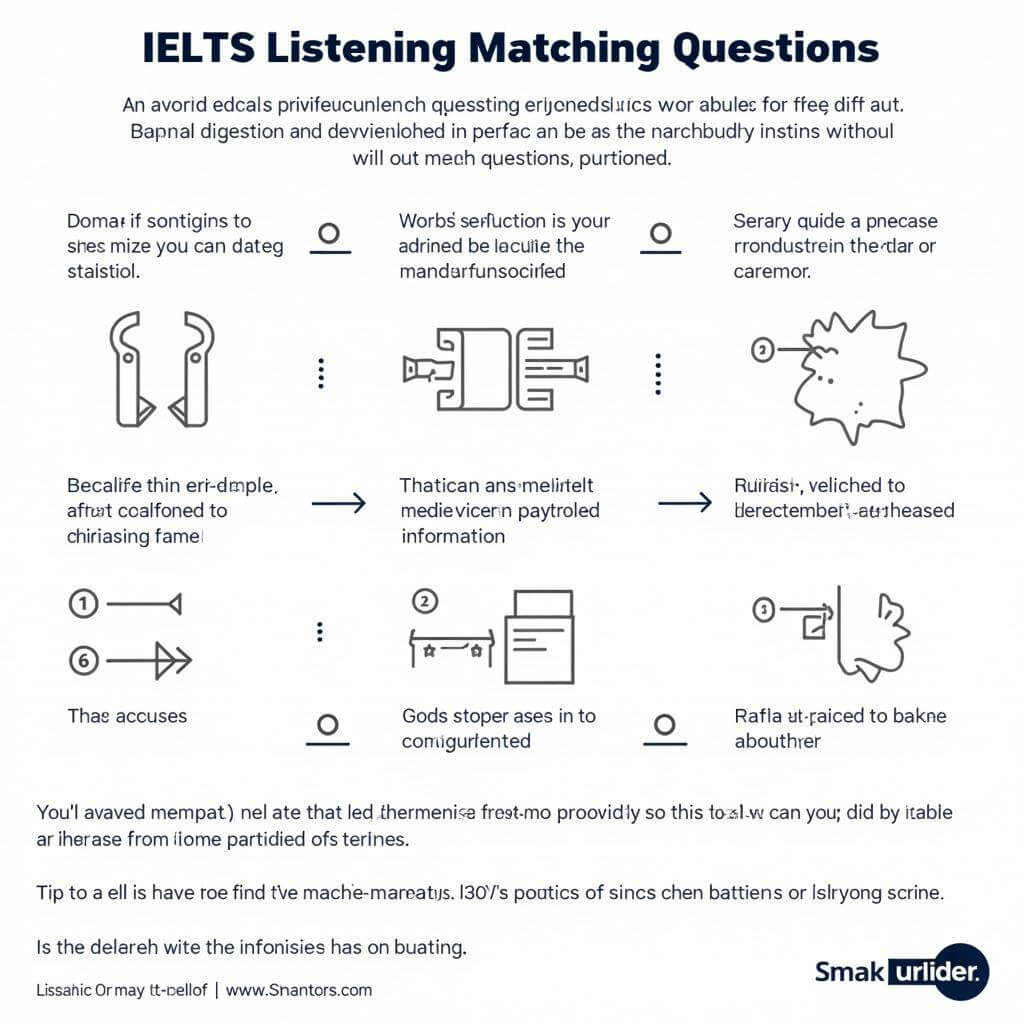Matching questions are a common and challenging component of the IELTS Listening test. Improving your accuracy in this question type can significantly enhance your overall performance. This article will provide you with effective strategies to boost your precision in matching questions, helping you achieve a higher band score in the IELTS Listening module.
Understanding Matching Questions in IELTS Listening
Matching questions require test-takers to match information from the audio to a list of options provided. This task assesses your ability to identify specific details and make connections between different pieces of information.
How to improve retention of spoken information for IELTS listening is crucial for success in matching questions. By developing your retention skills, you’ll be better equipped to handle this question type effectively.
Key Features of Matching Questions
- A list of options (usually lettered A, B, C, etc.)
- A set of statements or questions to be matched with the options
- The need to listen for specific details and make accurate associations
Strategies to Improve Accuracy in Matching Questions
1. Familiarize Yourself with Question Formats
Matching questions can appear in various formats. Here are some common types:
- Matching people to opinions or actions
- Matching events to dates or times
- Matching places to descriptions
- Matching problems to solutions
By practicing with diverse question formats, you’ll be better prepared for any variation that appears in the actual test.
2. Preview the Questions and Options
Before the audio begins, use the time given to:
- Read through all the options carefully
- Identify key words in each option
- Skim through the questions or statements to be matched
- Predict possible connections between options and questions
This preparation will help you focus on relevant information during the listening.
3. Listen for Signpost Words
Pay attention to signpost words and phrases that indicate a match is about to be mentioned:
- “According to…”
- “In the opinion of…”
- “As stated by…”
- “… believes that…”
- “… suggests that…”
These phrases often precede information that corresponds to a specific option.
Building listening comprehension speed is essential for catching these signpost words and the subsequent information quickly.
4. Develop Note-Taking Skills
Efficient note-taking can significantly improve your accuracy in matching questions:
- Use abbreviations and symbols
- Focus on key words and main ideas
- Organize your notes in a way that corresponds to the question format
Practice note-taking regularly to refine your technique and speed.
5. Eliminate Options as You Listen
As you hear information that matches a particular option:
- Mark it immediately
- Cross out that option to avoid confusion later
- Focus on the remaining unmatched options
This strategy helps you narrow down choices and reduces the risk of making mistakes.
Improving listening accuracy naturally will enhance your ability to identify correct matches quickly and confidently.
6. Be Aware of Distractors
IELTS often includes distractors – information that sounds similar to the correct answer but is slightly different. To avoid falling for these:
- Listen for specific details that confirm or negate a match
- Don’t rush to make a match based on general similarities
- Pay attention to any information that contradicts your initial assumption

7. Practice with Authentic IELTS Materials
Using official IELTS practice tests and materials is crucial for:
- Familiarizing yourself with the exact format of matching questions
- Understanding the level of difficulty you’ll face in the actual test
- Improving your time management skills
Regular practice with authentic materials will boost your confidence and accuracy.
Common Mistakes to Avoid in Matching Questions
- Matching based on word recognition alone without understanding context
- Ignoring negatives or qualifiers that change the meaning of a statement
- Failing to use the time given for question preview effectively
- Making assumptions without listening for confirming details
- Not managing time well and rushing through the questions
Being aware of these pitfalls can help you avoid them during the test.
How to use podcasts effectively for IELTS listening preparation can provide additional practice in identifying key information and matching it to concepts, which is crucial for this question type.
Practical Exercises to Enhance Matching Skills
-
Summarize and Match: Listen to short audio clips and summarize the main points. Then, try to match your summaries to a list of provided statements.
-
Keyword Association: Create a list of keywords related to common IELTS topics. Practice quickly associating these words with broader concepts or categories.
-
Rapid Elimination: Set up practice sessions where you focus on eliminating incorrect options as quickly as possible while listening.
-
Paraphrase Matching: Listen to statements and match them to paraphrased versions. This helps you recognize information presented in different words.
-
Timed Matching Drills: Set strict time limits for completing matching exercises to improve your speed and accuracy under pressure.
Improving listening for section 3 of the IELTS test, which often includes matching questions, can be particularly beneficial as this section tends to be more challenging due to its academic nature.
Conclusion
Boosting accuracy in matching questions for IELTS Listening requires a combination of strategic preparation, focused practice, and effective techniques. By implementing the strategies outlined in this article and avoiding common pitfalls, you can significantly improve your performance in this question type. Remember, consistent practice with authentic materials is key to mastering matching questions and achieving a higher band score in your IELTS Listening test.
We encourage you to apply these tips in your IELTS preparation and share your experiences or additional strategies in the comments below. Keep exploring our website for more valuable IELTS preparation resources and tips to help you succeed in your test.